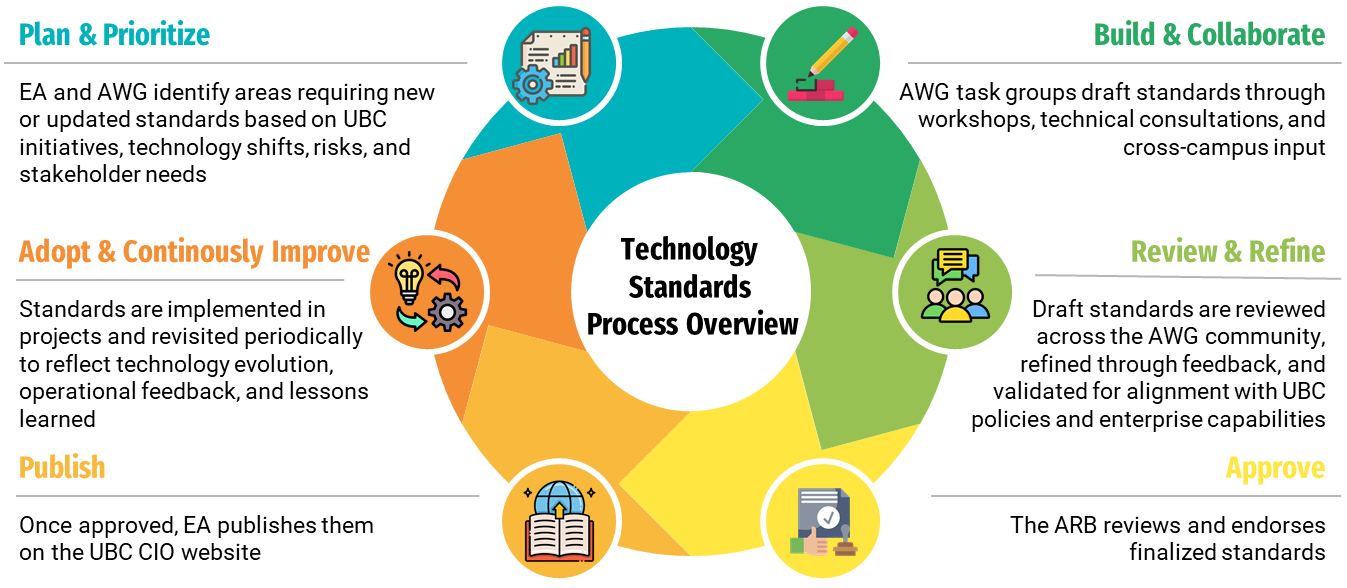In today’s rapidly evolving technological landscape, universities must utilize a robust IT infrastructure to meet their educational and operational goals. At UBC, we understand the importance of establishing clear and effective technology standards to guide our IT practices. These standards not only enhance our academic environment but also ensure secure and efficient operations, equipping our constituents for success in an increasingly digital world
Overview
UBC Technology Standards provide a common foundation for selecting and using information technologies across the university. They ensure our tools and platforms are secure, reliable, and aligned with UBC’s teaching, learning, research, and administrative priorities.
By following these standards, UBC:
- Protects sensitive information and meets compliance requirements.
- Streamlines technology choices and reduces duplication.
- Improves user experience through consistent, supported tools.
- Enables innovation on a trusted, shared foundation.
Importance of Technology Standards
Technology standards are essential for UBC to:
- Protect information assets and reduce security risks.
- Simplify the technology landscape by reducing duplication and technical debt.
- Enable interoperability so systems and tools work together effectively.
- Optimize investments by leveraging enterprise solutions.
- Support UBC’s academic and administrative mission through reliable, scalable services.
Standards also provide clarity for faculty, staff, and IT partners by identifying which technologies are approved, supported, or being phased out.
How Technology Standards are developed at UBC
UBC’s Technology Standards are developed through a collaborative, transparent, and structured process led by the Architecture Working Group (AWG), with endorsement from the Architecture Review Board (ARB) and support from the Enterprise Architecture (EA) team.
This ensures that standards reflect institutional needs, emerging technologies, and evolving best practices.
Process Overview
The development of UBC Technology Standards follows a six-step lifecycle, shown in the diagram below:
Each stage involves the appropriate governance bodies and subject-matter experts, ensuring that standards are:
- Practical - applicable across diverse academic and administrative contexts
- Inclusive - developed with input from faculties, IT units, and campus partners
- Adaptive - able to evolve as technology, compliance requirements, and institutional priorities change
Applicability Statement
These standards apply to:
- All UBC faculties, departments, and administrative units.
- All IT service providers delivering solutions to or on behalf of UBC.
- Vendors and partners when supplying or supporting technology for the university.
They cover both enterprise-level technologies and local implementations where alignment with university-wide standards is required.
Where deviations are needed, teams are encouraged to engage early with the Enterprise Architecture group to discuss options.
Key Areas of Focus
UBC Technology Standards are organized into domains that provide structure and clarity across the university’s digital environment. The first two domains below contain developed, published standards. Additional domains are planned for future phases and will be developed as UBC’s standards program expands:
- Security & Compliance
Identity & Access Management (IAM) Standards
Defines how UBC manages user identities, authentication, authorization, and access to digital resources. Includes user registration, credential issuance, authentication services, and single sign-on standards. Ensures security, privacy, and regulatory compliance across all UBC systems. - Collaboration & Content Services
Productivity & Collaboration Standards
Sets direction for tools that support teamwork, communication, and content creation. Covers visual collaboration, note-taking, event management, surveys and polling tools, remote access, task management, and collaborative content workspaces—enabling consistent, secure, and effective digital collaboration across campus.
Future Domains (Planned)
The domains below are not yet developed but represent planned areas where standards will be created as the program matures. These will be introduced in future phases based on institutional needs, governance priorities, and available capacity.
- Emerging Technologies
Will provide guidance for responsibly exploring and assessing emerging technologies—such as AI, automation, advanced analytics, and digital experience platforms—ensuring thoughtful, compliant, and strategic adoption. - Cloud & Infrastructure Services
Will define standards for hybrid cloud environments, cloud architecture, compute services, infrastructure-as-code, and modernization of legacy systems as UBC advances its cloud strategy. - Enterprise Platforms and Applications
Will cover standards for enterprise SaaS platforms, institutional applications, data platforms, integration technologies, and analytics environments. Focus will include interoperability, data residency, accessibility, and lifecycle governance. - Network & Connectivity
Will define standards for secure, resilient, modern connectivity across UBC campuses and cloud environments, including wired and wireless networks, VPN, zero-trust access, SD-WAN, and cloud interconnects. References will align with Network Services documentation.
